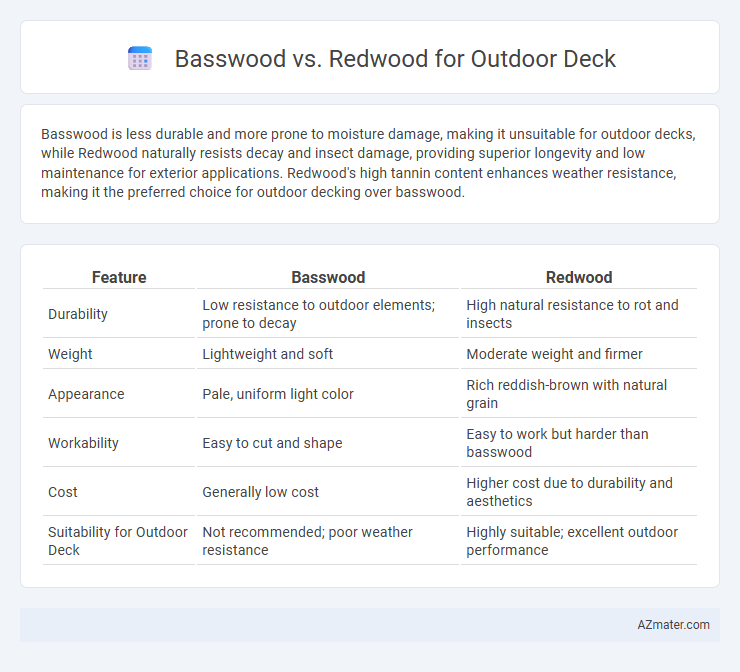Basswood is less durable and more prone to moisture damage, making it unsuitable for outdoor decks, while Redwood naturally resists decay and insect damage, providing superior longevity and low maintenance for exterior applications. Redwood's high tannin content enhances weather resistance, making it the preferred choice for outdoor decking over basswood.
Table of Comparison
| Feature | Basswood | Redwood |
|---|---|---|
| Durability | Low resistance to outdoor elements; prone to decay | High natural resistance to rot and insects |
| Weight | Lightweight and soft | Moderate weight and firmer |
| Appearance | Pale, uniform light color | Rich reddish-brown with natural grain |
| Workability | Easy to cut and shape | Easy to work but harder than basswood |
| Cost | Generally low cost | Higher cost due to durability and aesthetics |
| Suitability for Outdoor Deck | Not recommended; poor weather resistance | Highly suitable; excellent outdoor performance |
Introduction: Basswood vs Redwood for Outdoor Decks
Basswood and redwood are two popular choices for outdoor decks, each offering unique benefits in terms of durability and appearance. Redwood is naturally resistant to decay, insects, and moisture, making it ideal for long-lasting outdoor structures, while basswood is valued for its smooth grain and light color, though it requires additional treatment for outdoor use. Comparing their costs, maintenance needs, and weather resistance helps in selecting the best wood for a resilient and attractive outdoor deck.
Wood Characteristics: Density and Grain
Basswood is a light-density hardwood with a fine, uniform grain that offers excellent workability but lower natural durability for outdoor decks. Redwood features a moderate density and a distinctive straight, open grain that enhances its resistance to decay and weathering in exterior applications. Both woods require protective finishes to maximize longevity, but redwood's higher density and natural stability make it a preferred choice for outdoor decking exposed to moisture.
Durability and Weather Resistance
Basswood offers moderate durability and is less resistant to outdoor weather conditions compared to redwood, making it less ideal for long-term outdoor decks. Redwood is highly favored for outdoor decking due to its natural resistance to decay, insects, and moisture, providing superior weather resistance and longevity. Choosing redwood can result in a more durable deck that withstands harsh climates without extensive maintenance.
Maintenance Requirements
Basswood requires frequent sealing and staining to protect against moisture and prevent warping, making its maintenance more intensive compared to other woods. Redwood naturally contains tannins and resins that resist decay and insect damage, significantly reducing the need for regular treatment and upkeep. Due to its durability and resistance properties, redwood decks generally demand less maintenance, offering a longer lifespan with minimal intervention.
Longevity and Lifespan
Basswood offers moderate durability for outdoor decks but generally has a shorter lifespan compared to redwood, as it is more susceptible to decay and insect damage. Redwood is prized for its superior natural resistance to rot, decay, and insect infestations, resulting in a longer lifespan that can exceed 20-30 years with proper maintenance. The stability and density of redwood contribute to its longevity, making it a premium choice for long-lasting outdoor decking projects.
Cost Comparison
Basswood offers a more affordable option for outdoor decks, with prices typically ranging between $2 to $4 per board foot, making it budget-friendly compared to Redwood. Redwood, prized for its rot resistance and rich color, generally costs between $5 to $8 per board foot, reflecting its premium quality and durability. When balancing cost and longevity, Basswood suits economical projects, while Redwood justifies its higher price through extended lifespan and lower maintenance needs.
Environmental Impact and Sustainability
Basswood and redwood differ significantly in environmental impact and sustainability when used for outdoor decks. Basswood, being a fast-growing, renewable hardwood, offers a lower carbon footprint and is often sourced from managed forests that prioritize ecological balance. Redwood, valued for its natural resistance to decay, comes from slower-growing trees, which can lead to longer harvesting cycles and potential habitat disruption if not responsibly managed.
Aesthetic Appeal: Color and Texture
Basswood offers a light, creamy color with a fine, even texture that provides a smooth, natural appearance ideal for a clean, modern outdoor deck. Redwood features rich reddish-brown hues and prominent grain patterns that create a warm, rustic aesthetic perfect for traditional or cabin-style decks. Both woods age gracefully, with basswood developing a soft patina and redwood deepening in color when exposed to sunlight and weather.
Suitability for Different Climates
Basswood offers moderate resistance to moisture and decay, making it better suited for dry or temperate climates where humidity levels are low. Redwood exhibits superior natural durability and contains tannins that protect it from insects and rot, making it ideal for wet, coastal, or humid environments. Choosing between basswood and redwood for an outdoor deck depends largely on local climate conditions to ensure long-lasting performance and minimal maintenance.
Final Verdict: Which Wood is Best for Outdoor Decks?
Redwood offers superior natural resistance to decay, insects, and moisture, making it a top choice for outdoor decks that require long-lasting durability and minimal maintenance. Basswood, while lightweight and easy to work with, lacks the inherent rot resistance necessary for enduring harsh outdoor conditions without significant treatment. For outdoor decking, redwood's proven resilience and aesthetic appeal make it the best wood option compared to basswood.

Infographic: Basswood vs Redwood for Outdoor Deck
 azmater.com
azmater.com